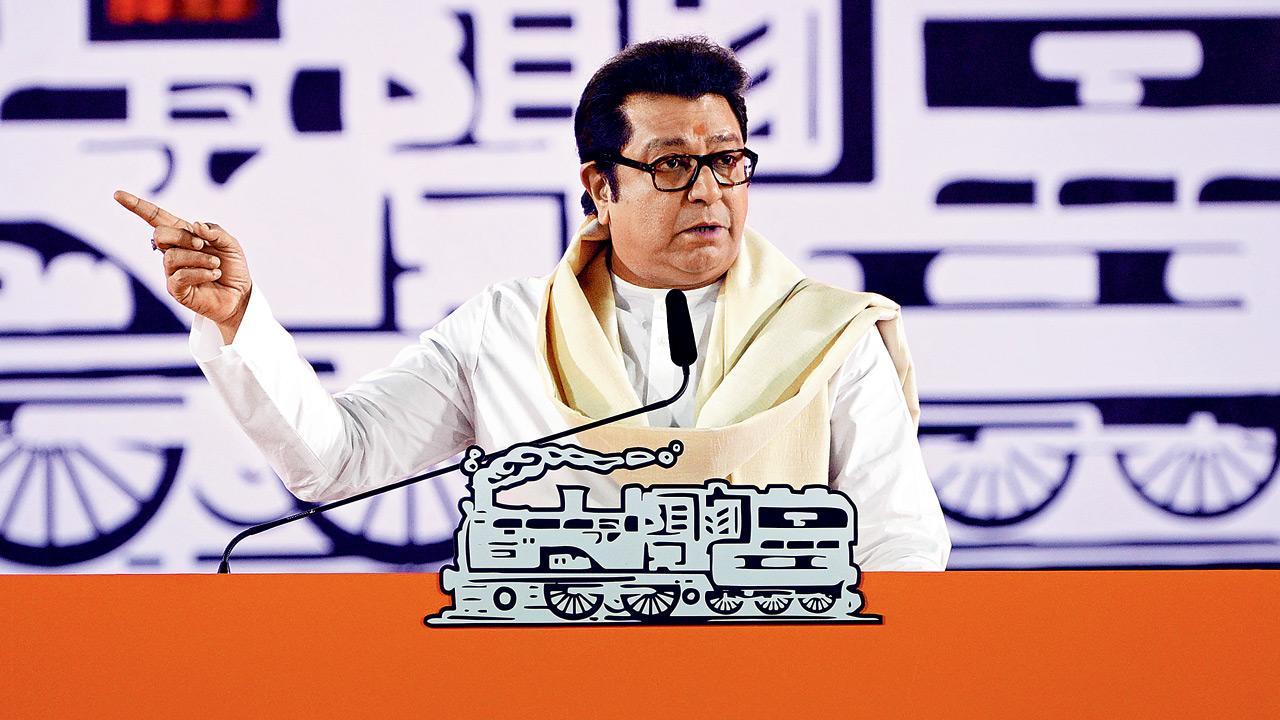According to the Government Resolution (GR), the current two-language format in schools will be replaced by a three-language structure under NEP, with Hindi made mandatory in addition to English and Marathi.

MNS chief Raj Thackeray during Gudi Padwa last month. File pic/Rane Ashish
Maharashtra Navnirman Sena (MNS) chief Raj Thackeray has strongly opposed the state government’s decision to make Hindi a compulsory subject for students from Std 1 to 5 under the National Education Policy (NEP) 2020. Thackeray’s objection came a day after the state approved the implementation of NEP, mandating Hindi as a third language in Marathi and English medium schools.
“Hindi is not the national language. Every state has its own mother tongue, and Hindi is just one of them. Marathi, Hindi, and English should be used for government and official work only—one cannot and should not force students to learn Hindi,” Thackeray said in a post on X (formerly Twitter). “MNS strongly opposes this policy and will not tolerate it,” he warned.
The MNS chief, estranged nephew of the late Shiv Sena supremo Bal Thackeray, added, “We are Hindu, not Hindi. The government must keep this in mind before proceeding with such a decision.”
What the GR says
According to the Government Resolution (GR), the current two-language format in schools will be replaced by a three-language structure under NEP, with Hindi made mandatory in addition to English and Marathi. The NEP 2020 reaffirms the three-language formula, with emphasis on multilingualism and flexibility. It states that students must learn three languages—at least two of which must be native to India. The medium of instruction until at least Grade 5 (preferably Grade 8) should be the child’s mother tongue or regional language wherever possible.
While the policy doesn’t mandate Hindi explicitly, several states, including Maharashtra, have interpreted it as Hindi + English + regional language—leading to friction in non-Hindi-speaking states.
Southern resistance
Southern states, especially Tamil Nadu, have historically opposed the three-language formula. Since the 1960s, Tamil Nadu has followed a two-language policy—Tamil and English. The ruling DMK sees the NEP as a covert push for Hindi imposition. CM M.K. Stalin has been vocal against the centralised approach to language policy.
Fadnavis defends
Chief Minister Devendra Fadnavis defended the state’s decision, stating it is aligned with NEP 2020 and not a new development. “Everyone in Maharashtra must know Marathi. The Union government believes there should be a common language for communication across India. Hindi has been introduced in that spirit,” Fadnavis told reporters. However, Opposition to the three-language policy has existed since the NEP's draft release in 2019. Following public backlash, the Union HRD Ministry had revised the draft to remove the impression of compulsory Hindi. Yet, concerns about language imposition have persisted.
Minority institutions
The stricter enforcement of Marathi and Hindi in schools, including CBSE, ICSE, IB, and minority institutions, has sparked worries among educators. “In many schools, students learn Urdu, Tamil, Malayalam, or other mother tongues. If English, Hindi, and Marathi are all mandatory, where’s the room for linguistic diversity?” asked an educationist on condition of anonymity. “Optional languages like Sanskrit or Tamil may get sidelined unless students take up a fourth language—which is unrealistic in most school timetables.”
Background
Maharashtra has traditionally followed a three-language system—Marathi (compulsory), Hindi, and English. Under NEP, this structure is being strictly enforced across all school boards, including minority-run and non-state institutions.
Ghatkopar food row ignites Marathi vs non-Marathi tensions
The MNS has also responded sharply to a Marathi versus non-Marathi controversy in Ghatkopar, where a Gujarati community member allegedly shamed a Marathi family for eating non-vegetarian food. Videos of the incident circulated online prompted MNS leaders to visit the society and issue a warning. “MNS will not tolerate any diktat from other communities, especially Gujaratis, on the eating habits of Marathi people,” said MNS leader Sandeep Deshpande. Shiv Sena (UBT) MP Sanjay Raut weighed in, claiming this was another flashpoint in the Marathi vs non-Marathi identity clash. He recalled that a few months ago, an RSS leader had stated that people migrating to Mumbai don’t learn Marathi because the city lacks a unified language—using Ghatkopar as an example. After the backlash, the RSS leader issued a clarification, stating his comments were misinterpreted.
 Subscribe today by clicking the link and stay updated with the latest news!" Click here!
Subscribe today by clicking the link and stay updated with the latest news!" Click here!








